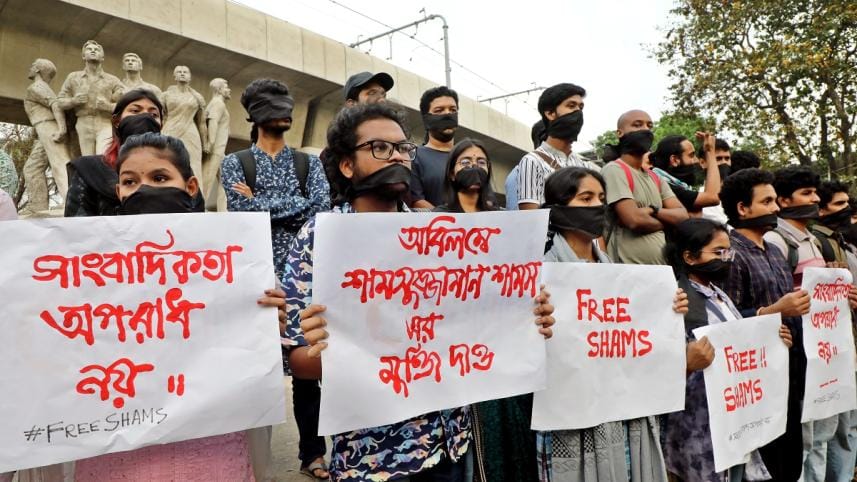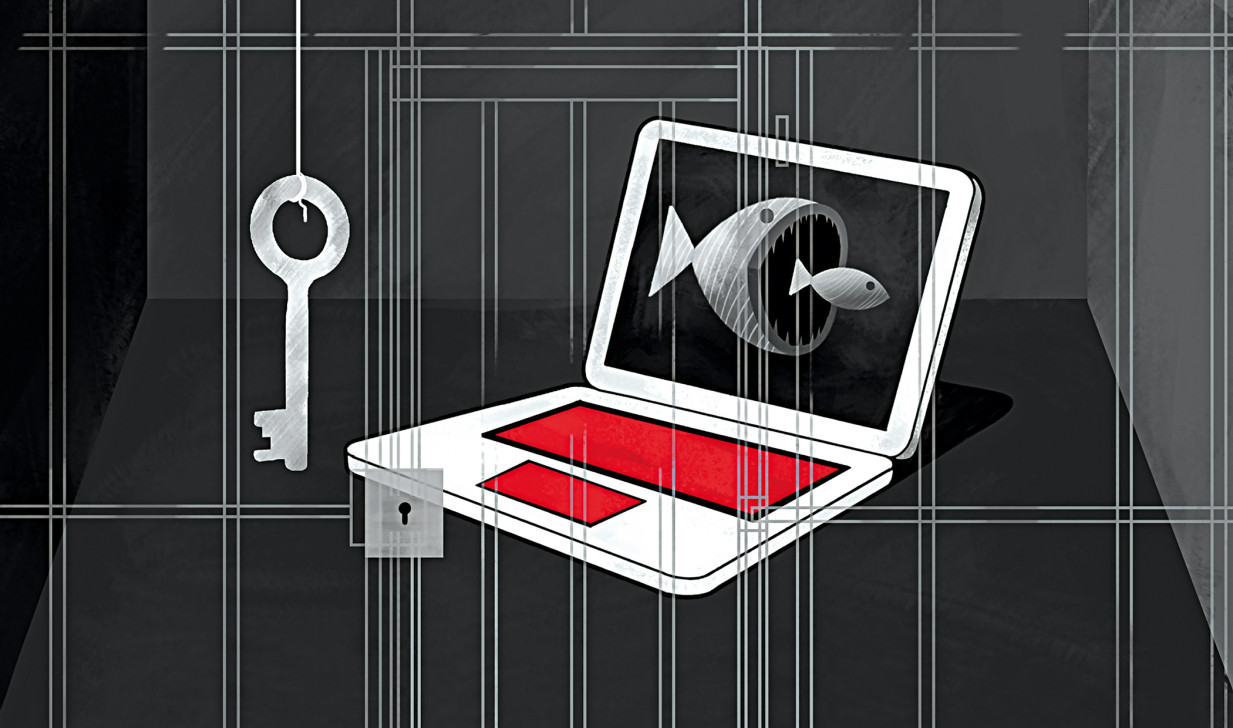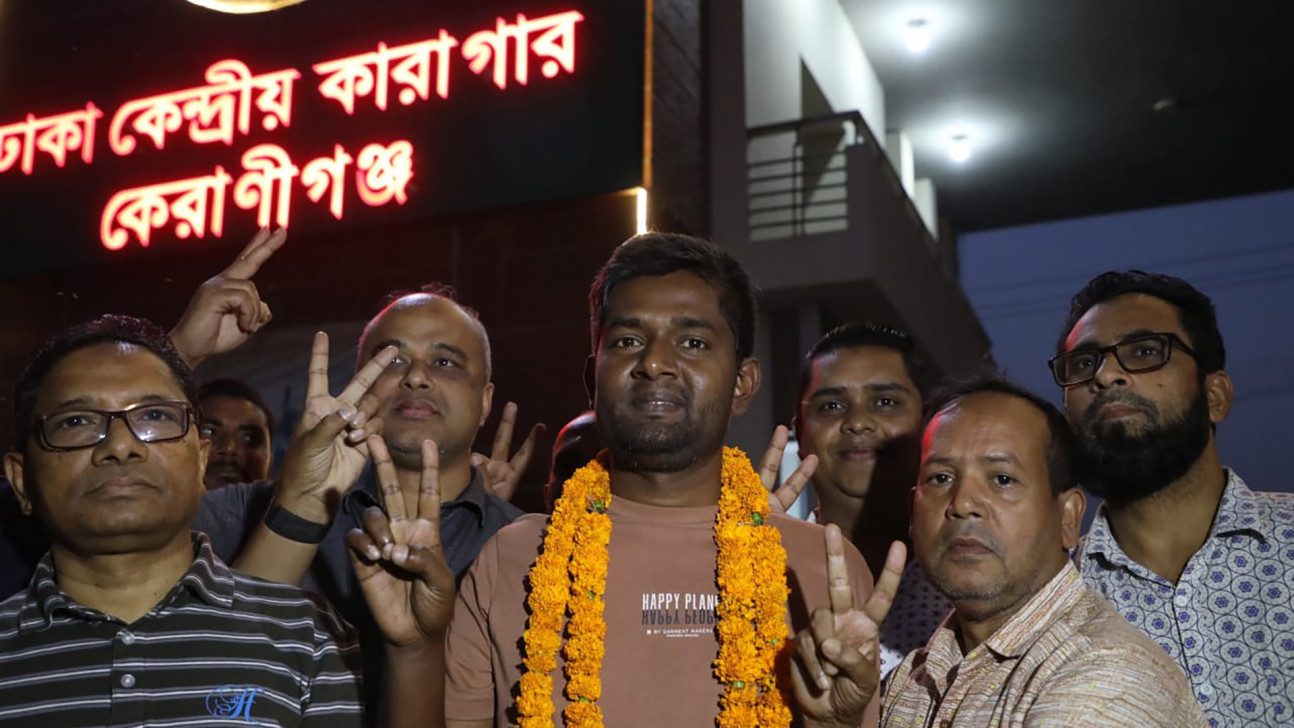What the law minister's DSA statement reveals

The brief statement from Law Minister Anisul Huq in parliament on Monday regarding the Digital Security Act (DSA), 2018 is a welcome development in the sense that we finally have a count of the number of cases filed under the law since its introduction in October 2018. The minister informed that, until January 2023, a total of 7,001 cases had been filed under the law. Until now, there was no account from the government that provided a picture on the extent of the use of the law. The law minister, however, has not informed us as to how many people have been accused in these cases. He has deferred it to the home ministry, and we hope at some point the home minister and/or respective officials will come forward to provide this number, too.
The number of cases is staggering by all accounts, but far from surprising to those who have been closely following the wanton use of the law over the past 56 months. Instead, it only reaffirmed what national and international human rights organisations have been saying: it is a draconian law. The number of cases in 52 months, as provided by the law minister, shows that 134 cases have been filed on average each month, which means the average number of cases filed each day was 4.48 (or roughly five cases a day).
Although this piece of information does not present a comprehensive picture, it does provide a glimpse into the gravity of the situation.
Since January 2020, under a research project sponsored by the Centre for Governance Studies (CGS), we have been tracking the use of the DSA since its inception. Gathering data, especially from government sources, has been an uphill task. Saad Hammadi, a human rights activist, requested the data from the police in June 2021. He was given a runaround. Drawing on various sources, as of May 31, 2023, we have been able to track 1,325 cases in which 4,121 individuals have been accused. The data show that the average number of people accused in each case was 3.11. There are no reasons to believe that there is a different pattern in the total number of cases. As such, we can extrapolate the total cases based on our sample, which will suggest that at least 21,770 people have been accused.
Of our sample of 4,121 individuals, 1,454 had been arrested – which is roughly one in three accused. Based on that pattern, of the 21,770 accused, it is safe to say at least 7,692 were arrested. That would mean that the average number of arrests per month was 137, roughly five individuals a day. This number should give pause to anyone and make them realise how widespread the use of the DSA has been for the past 56 months.
The primary reason for being accused and arrested under the law is expressing contrarian views in cyberspace. Anyone expressing a view that annoys the government and supporters of the ruling party has been subjected to persecution through the use of this law. Over the years, the DSA has become the weapon of choice for ruling party activists. Research data published in our report in February 2023 – titled "What's happening: Trends and Patterns of the Digital Security Act 2018 in Bangladesh") – have documented that 39.13 percent of the cases were filed by individuals affiliated with political parties, 22.17 percent by law enforcement agencies, and 8.02 percent by government officials. Of those who were affiliated with the political parties, almost 80 percent were directly involved with the ruling Awami League. Unless there is a serious break in this pattern, we can make an informed guess as to who the accusers are in the 7,001 cases that the law minister mentioned in parliament.
The figure provided by the law minister reveals the gravity of the situation pertaining to the use of the DSA. Although we won't hold our breath, we hope that the government will release information about the number of individuals accused and detained under the law. Given that most of the offences are considered non-bailable, hundreds of people are languishing in jails as pre-trial detainees. Lest we forget that Mushtaq Ahmed, an author, died in jail in February 2022 after being detained for ten months and denied bail six times. But most importantly, the number has once again reminded us that it is time to repeal the DSA 2018 altogether and replace it with a law, developed in consultation with stakeholders, to protect the citizens rather than criminalising freedom of expression.
Demand for scrapping the DSA 2018 has been raised since its inception as human rights organisers, journalists, and members of civil society could foresee the impacts of it on freedom of expression. Yet, ministers and ruling party leaders insisted that it will not hinder freedom but will protect citizens. Occasionally, ministers have recognised that the DSA has been "misused," implying that they are sporadic and an aberration. But witnessing the excessive use of the law and inconsistencies with the fundamental rights of citizens, the Office of the UN High Commissioner for Human Rights (OHCHR) last year recommended that two articles of the law be scrapped and eight amended. The government neither shared the observation with the public, nor acted on the recommendations. On March 31, in the wake of the arrest of a Prothom Alo reporter and a case filed against its editor, Matiur Rahman, UN Human Rights Chief Volker Turk called on the government to immediately suspend the Digital Security Act. He said, "I am concerned that the Digital Security Act is being used across Bangladesh to arrest, harass and intimidate journalists and human rights defenders, and to muzzle critical voices online."
In May, during his trip to Dhaka, the United Nations special rapporteur on extreme poverty and human rights Olivier De Schutter expressed grave concern over the misuse of the Digital Security Act and urged for the suspension of the law. Despite international clamouring, the law minister has unequivocally rejected the possibility of scrapping the DSA. He, however, has said that the law will be amended by September. The promise to amend the law has been made by ministers many times over the past years, only to be broken repeatedly. In fact, even before the DSA was passed by parliament in September 2018, ministers had promised to editors that the law would be amended.
The figure provided by the law minister reveals the gravity of the situation pertaining to the use of the DSA. Although we won't hold our breath, we hope that the government will release information about the number of individuals accused and detained under the law. Given that most of the offences are considered non-bailable, hundreds of people are languishing in jails as pre-trial detainees. Lest we forget that Mushtaq Ahmed, an author, died in jail in February 2022 after being detained for ten months and denied bail six times. But most importantly, the number has once again reminded us that it is time to repeal the DSA 2018 altogether and replace it with a law, developed in consultation with stakeholders, to protect the citizens rather than criminalising freedom of expression.
Ali Riaz is distinguished professor of political science at Illinois State University, a non-resident senior fellow of the Atlantic Council and president of the American Institute of Bangladesh Studies (AIBS).




 For all latest news, follow The Daily Star's Google News channel.
For all latest news, follow The Daily Star's Google News channel. 



Comments